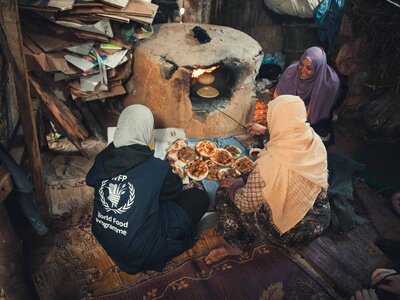Palestine
- 1.6 million
- people facing high levels of acute food insecurity
- 100,000-plus
- children projected to face acute acute malnutrition
- 5.5 million
- population across Palestine
For decades, Palestine has been facing a protracted and complex protection and humanitarian crisis. The crisis is tied to prolonged occupation, internal political divisions, and recurrent conflict that pose a threat to stability and development of the Palestinian people.
The humanitarian situation worsened alarmingly after an upsurge in violence from October 2023. The humanitarian situation worsened alarmingly after an upsurge in violence from October 2023. At least 1.6 million people - or 77 per cent of the population - are facing high levels of acute food insecurity, according to the latest Integrated Food Security Phase Classification (IPC). This includes over 100,000 children and 37,000 pregnant and breastfeeding women projected to suffer acute malnutrition through to April 2026.
Relentless conflict, the collapse of essential services and severe limitations on the delivery and distribution of humanitarian assistance have led to catastrophic conditions.
A ceasefire has paved the way for humanitarian agencies to reach vulnerable populations previously cut off from life-saving aid.
There is also deep concern over the escalating violence and movement restrictions in the West Bank, which are severely disrupting markets, livelihoods and food security. More than 40,000 people have been displaced since mid-January 2025.
What the World Food Programme is doing in Palestine
-
Food assistance
-
WFP provides unconditional food assistance, when this is possible. In addition to general food distributions - parcels that contain pasta, pulses and canned food - WFP also provides assistance through hot meals kitchens, and provides wheat flour, yeast, sugar and salt to bakeries to support local bread production. WFP also provides complementary nutritional supplements to pregnant and breastfeeding women, and children under 5 to meet their increased needs.
-
Livelihood support
-
Capacity strengthening
-
Enabling partners
Palestine news releases
Go to pagePartners and donors
Find out more about the state of food security in Palestine
Visit the food security analysis pageOperations in Palestine
Contacts
Office
c/o UNDP/PAPP 4A Yakubi Street, PO BOX 51359 Jerusalem, Israel
Jerusalem
Palestinian Territories






